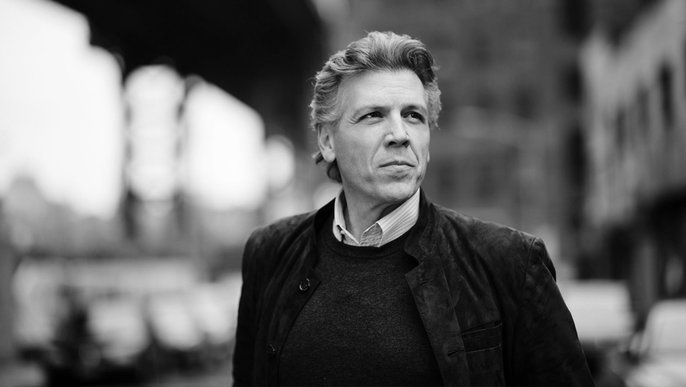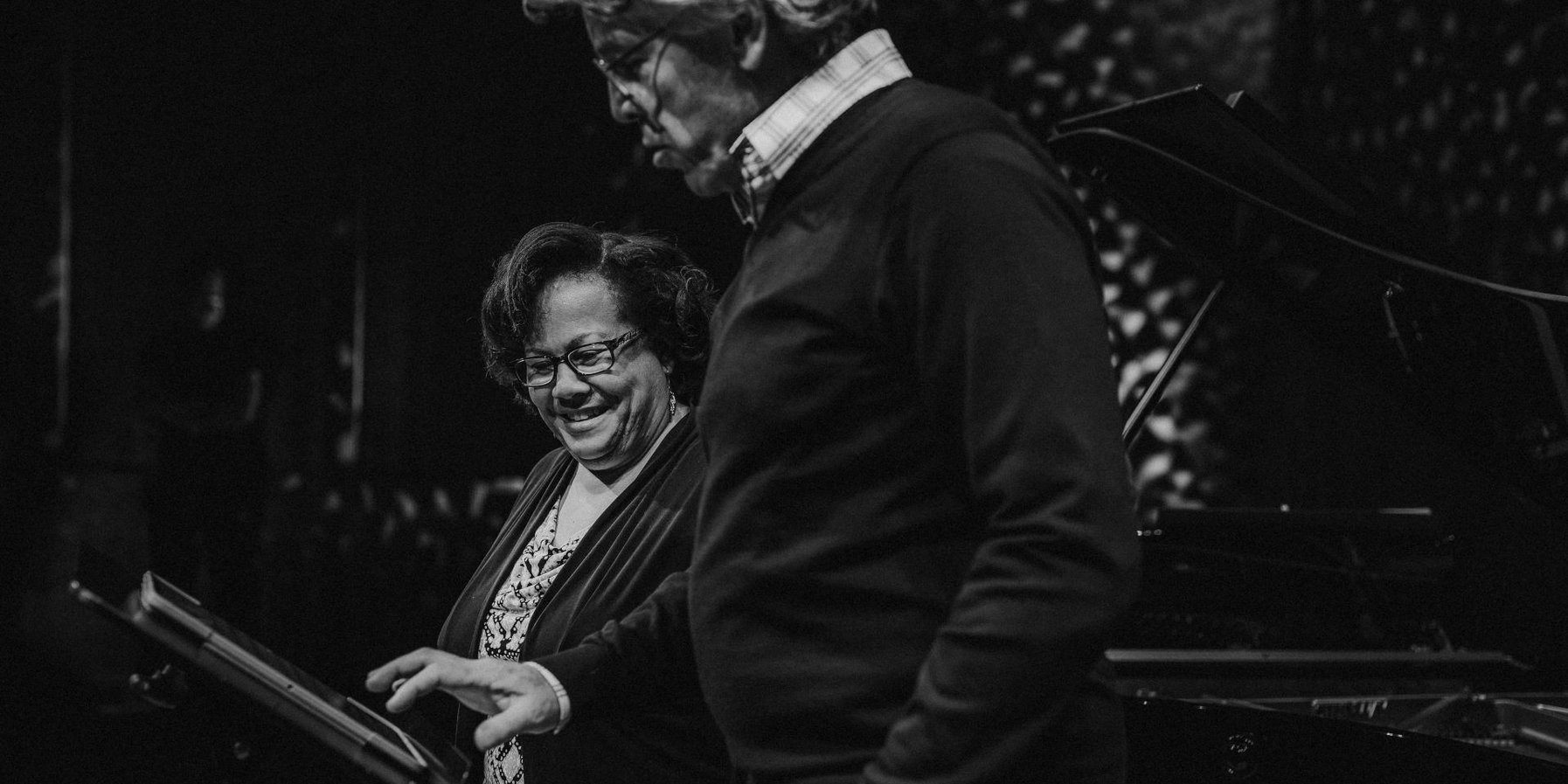»I, too, sing America«. With these powerful words, African American poet Langston Hughes expressed the right of Black people to be an equal part of American culture and society. As a member of the »Harlem Renaissance«, a dynamic movement initiated by African American artists in the 1920s, Hughes helped transform American arts and letters. With his deeply humanistic attitude, and through his intellect, sense of humour and integrity, he produced works that remain timeless and touching to this day. The concert programme »Langston Hughes: Singing Harlem in Europe« features musical settings of his texts by composers like Wilhelm Grosz, Florence Price and Leonard Bernstein, showing that humanity and truthfulness know no bounds – neither then, nor now.
Note: All Hamburg International Music Festival 2021 concerts are available to stream free of charge. Once premiered, each concert stream can be accessed for the whole festival period.
Thomas Hampson: A Celebration of Black Music
Performers
Louise Toppin soprano
Leah Hawkins soprano
Ema Nikolovska mezzo-soprano
Lawrence Brownlee tenor
Justin Austin baritone
Thomas Hampson baritone
Howard Watkins piano
Joseph Joubert piano
Programme
»Langston Hughes: Singing Harlem in Europe«
Duration: approx. 90 minutes
-
Complete programme
Kurt Pahlen
Auch ich bin AmerikaHermann Reutter
Trommel / from: Meine dunklen Hände
Lied für ein dunkles Mädchen »Wenn Susanna« / from: Meine dunklen HändeWilhelm Grosz
Afrika-Songs / cycle for soprano, baritone und piano, Op. 29 (selection)Howard Swanson
Joy
Night Song
The Negro Speaks of RiversFlorence B. Price
BewildermentMargaret Bonds
Three Dream Portraits
Songs of the SeasonsRobert Owens
In Time of Silver Rain, Op. 11/1
Carolina Cabin, Op. 11/5
Desire, Op. 13/1
Mortal Storm, Op. 29H. Leslie Adams
Prayer / from: NightsongsAndre Myers
Harlem Night SongGeorge Walker
In Time of Silver RainHale Smith
March Moon / from: Beyond the Rim of Day
To a Little Lover-Lass, DeadHarriette Davison Watkins
Troubled Woman
In Time of Silver RainRichard Thompson
The Negro Speaks of Rivers / from: Dream Variations
Black Pierrot / from: Dream VariationsBrandon J. Spencer
Dream VariationDamien Sneed
I Dream a WorldLeonard Bernstein
I, Too, Sing America / from: Songfest
The Artists
Louise Toppin – soprano

-
About Louise Toppin
Louise Toppin has received critical acclaim for her operatic, orchestral, and oratorio performances in the United States, Europe, South America, Asia, New Zealand, Cuba, Puerto Rico and the Caribbean. She has appeared in recital on many concert series including Carnegie Hall, Kennedy Center, Broadway’s Hudson Theater, and Lincoln Center.
Her recent performances include the 150th celebration of the ratification of the 13th amendment for Congress and President Obama at the U.S. Capitol; a performance in Havana, Cuba with the women’s orchestra Camerata Romeu and the opening of the Smithsonian’s African American Heritage Museum. Currently, she tours in »Gershwin on Broadway« with Joseph Joubert, piano and Robert Sims, baritone.
Louise Toppin has recorded eighteen compact disks of primarily American Music. Her newest releases are »Songs of Love and Justice« and »Summer.Life.Songs« with songs by Adolphus Hailstork and Duos on African American vocal chamber music.
As a musicologist and scholar, Louise Toppin has edited numerous scores of works by Margaret Bonds and Adolphus Hailstork. She has lectured on the music of African American composers and has appeared on NPR’s »All Things Considered«, on national conventions and on college campuses including Harvard, Tufts, and Duke.
As the co-founder and director of the George Shirley Vocal Competition and the non-profit organisation Videmus, Louise Toppin encourages the performance and scholarship of African American compositions by students and scholars. She is also the founder of the africandiasporamusicproject.org that is a research tool to locate the repertoire of composers of the African Diaspora from the 1600s to the present. She is currently Professor of Music at The University of Michigan.
Leah Hawkins – soprano

-
About Leah Hawkins
A native of Philadelphia and recent graduate of the Lindemann Young Artist Development Program at The Metropolitan Opera, soprano Leah Hawkins is regarded as one of the most promising singers of her generation.
She began the 2020–2021 season with a debut at the Bayerische Staatsoper in Marina Abramović’s »7 Deaths of Maria Callas« as Desdemona – a role that she will reprise for debuts at Deutsche Oper Berlin, Opéra national de Paris, Greek National Opera, and Teatro del Maggio Musicale Fiorentino.
Recent performances at The Metropolitan Opera include »Porgy & Bess« (Strawberry Woman), »Pique Dame« (Masha) and »Aida« (High Priestess). She made her Colorado Symphony debut in the Verdi »Requiem«, gave a recital at the Park Avenue Armory, and returned to the National Symphony Orchestra for a Labor Day Concert.
On the concert stage Leah Hawkins has appeared with orchestras including Yale Philharmonia, New Haven Symphony Orchestra, Baltimore Symphony Orchestra, and Philadelphia Orchestra. She performed in venues such as the Bolshoi Theatre in Moscow, The White House, singing for the President of France, and in Accra, Ghana.
Leah Hawkins has received numerous awards including the Sullivan Foundation Award and the Richard F. Gold Career Grant from Washington National Opera.
Ema Nikolovska – mezzo-soprano

-
About Ema Nikolovska
Ema Nikolovska has been regarded as one of the most promising singers of her generation. Born in Macedonia, she grew up in Toronto where she studied voice and violin. In 2019 she was selected as a BBC New Generation Artist and won numerous prizes such as the 1st Prize at the International Vocal Competition in ‘s-Hertogenbosch and the Ferrier Loveday Song Prize at the Kathleen Ferrier Awards.
In autumn 2020 Ema Nikolovska joined the Berlin Staatsoper International Studio, where future performances include roles in »Hansel and Gretel«, »The Magic Flute« and »Hippolyte et Aricie«, »Jenufa« and »Rigoletto«. Highlights on the concert platform during 2021 include »Pulcinella« with the Musikkollegium Winterthur conducted by Barbara Hannigan, and recitals at the Pierre Boulez Saal, Wigmore Hall, Heidelberger Frühling, Verbier Festival, Schubertíada Barcelona and Berlin Konzerthaus. Ema Nikolovska collaborates with Malcolm Martineau, Wolfram Rieger, Sir Andràs Schiff and Barry Shiffman, among many others.
Lawrence Brownlee – tenor

-
About Lawrence Brownlee
Lawrence Brownlee is a leading figure in opera, both as a singer on the world’s top stages, and as a voice for activism and diversity in the industry. Captivating audiences and critics around the globe, he has been hailed as »one of the most in-demand opera singers in the world today« (NPR). He is a regular guest in many of the leading opera houses such as the Metropolitan Opera, Teatro alla Scala und the Bayerische Staatsoper. In addition, he performs in concert halls including Carnegie Hall New York and Wigmore Hall London
Highlights of Lawrence Brownlee’s 2020-21 season include Don Ramiro in »La Cenerentola« at Palau de les Arts Reina Sofía, his role debut as Edgardo in »Lucia di Lammermoor« at New National Theatre Tokyo and Arturo in »I Puritani« with Teatro dell’Opera di Roma. In concert, Brownlee performed at Lyric Opera of Chicago, Houston Grand Opera and Opera Philadelphia.
A passionate advocate for diversity initiatives, Lawrence Brownlee works with companies and engages civic organizations to create programs seeking to expand opera audiences. His critically-acclaimed solo recital program »Cycles of My Being«, a song cycle that centers on the black male experience in America today, has toured across the country three times.
Lawrence Brownlee has emerged as a pivotal voice in classical music’s shift toward digital programming and the resurgence of conversations around racial justice. In May 2020, he launched »The Sitdown with LB,« a weekly Facebook Live series which explores the experience of being an African-American opera singer. Since April 2020 he has also hosted the video series »Coffee and a Song,« in which he invites artist friends to perform interpretations of art-songs from the intimacy of their own homes.
Justin Austin – baritone

-
About Justin Austin
Praised in The Wall Street Journal for his »mellifluous baritone«, Justin Austin has been performing professionally since age 4. Born in Stuttgart, Germany, he performs a wide range of repertoire from Jazz, R&B, and Musical Theatre, to Opera and Oratorio.
He has performed and recorded numerous operatic, song, and oratorio world premiers by composers such as Wynton Marsalis, Avner Finberg, M. Roger Holland and Jack Perla. Moreover, he has collaborated with multiple groups and artists such as Aretha Franklin, The Boys Choir of Harlem, Mary J. Blige, Elton John, Lauryn Hill, 30 Seconds to Mars, Kanye West, and jazz legends Reggie Workman, Hugh Masekela, and Wynton Marsalis. Justin Austin sang at venues such as the Bayerische Staatsoper, Opera Saratoga, Bregenzer Festspiele, Lincoln Center, Carnegie Hall and New York Festival of Song.
For the 2021/22 season Justin Austin creates the leading role in the world premiere of the Lincoln Center Theater and The Metropolitan Opera co-commissioned opera »Intimate Apparel«. During the season 2020/21, he debuted with the Moab Music Festival as a resident artist and made his return to the New York Festival of Song for a virtual concert series.
Justin Austin strongly believes in utilizing his artistry to benefit music programs, new music projects, and community services around the world. He works with organizations such as MEND (Meeting Emergency Needs with Dignity,) QSAC (Quality Services for the Autism Community,) Holt International, and St. Mary’s Children’s Hospital.
Thomas Hampson – baritone

-
About Thomas Hampson
Thomas Hampson, America’s foremost baritone, has received international honors and awards for his captivating artistry and cultural leadership. Lauded as a Metropolitan Opera Guild »Met Mastersinger« and inducted into both the American Academy of Arts and Sciences and Gramophone’s »Hall of Fame,« Hampson is one of the most respected and innovative musicians of our time. With an operatic repertoire of over 80 roles sung in all the major theaters of the world, his discography comprises more than 170 albums, which include multiple nominations and winners of the Grammy Award, Edison Award, and the Grand Prix du Disque.
Hampson is a Distinguished Visiting Artist of Voice at the University of Michigan, School of Music, Theatre, and Dance, and an honorary professor on the Faculty of Philosophy of the University of Heidelberg. He holds honorary doctorates from Manhattan School of Music, the New England Conservatory, Whitworth College, and San Francisco Conservatory and is an honorary member of London’s Royal Academy of Music. He carries the titles of Kammersänger of the Wiener Staatsoper and Commandeur dans l’Ordre des Arts et des Lettres of the Republic of France, and was awarded the Austrian Medal of Honor in Arts and Sciences.
Thomas Hampson enjoys a singular international career as an opera singer, recording artist, and »ambassador of song,« maintaining an active interest in research, education, musical outreach, and technology, continually expanding his pedagogical activities. He is the Artistic Director of the Heidelberg Lied Academy, and collaborates with the Barenboim-Said Academy Schubert Week in Berlin each year. His recurring international master class schedule is a continuing online resource of the Manhattan School of Music, Medici.tv, and The Hampsong Foundation livestream channel.
Howard Watkins – piano

-
About Howard Watkins
American pianist Howard Watkins is a frequent associate of some of the world’s leading musicians on the concert stage and as an assistant conductor at the Metropolitan Opera. His appearances throughout the Americas, Europe, Asia, Russia, and Israel have included collaborations with Joyce DiDonato, Diana Damrau, Kathleen Battle and Anna Netrebko at such venues as the Metropolitan Museum of Art, Kennedy Center, the United States Supreme Court, Carnegie Hall, and the Bolshoi Theater in Moscow.
His current and former faculty affiliations include The Juilliard School, the Bard College Conservatory of Music, the Yale School of Music as a Visiting Presidential Fellow and the Aspen Music Festival. Currently a guest Master Coach for the Cafritz Young Artists of Washington Opera and the Opera Theater of St. Louis, Howard Watkins has worked on the music staffs of Palm Beach Opera, the Washington National Opera, and the Los Angeles Opera.
A native of Dayton, Ohio, Howard Watkins bas been honored as the 2004 recipient of the Paul C. Boylan award from the University of Michigan for his outstanding contributions to the field of music.
Joseph Joubert – piano

-
About Joseph Joubert
Joseph Joubert is a hugely versatile musician whose wide-ranging accomplishments and talent as a pianist, arranger, orchestrator, Broadway conductor, and music director have taken him around the world. He is at home in any style from classical to pop, gospel to Broadway, spiritual to R & B.
Most recently Joseph Joubert has done piano underscore recording and orchestration for the up-coming movie »Respect« starring Jennifer Hudson. He was co-producer and orchestrator for the »Georgia On My Mind« video that went viral for the Georgia election. In the 2021/22 season he will be musical supervisor for the play »Blue« at the Apollo Theater.
Joseph Joubert’s Broadway orchestration credits include »The Color Purple«, »Disaster« and »Violet«. He was musical director for Berry Gordy’s »Motown The Musical« and musical director, arranger, and pianist for Norm Lewis’s »American Songbook«, the PBS Live from Lincoln Center special. He received a Grammy nomination for »Best Arrangement Acompanying A Vocal« for the Broadway Inspirational Voices »Great Joy«.
As a record producer and orchestrator Joseph Joubert has worked with such artists as Ashford and Simpson, Diana Ross, Whitney Houston and Dionne Warwick. His orchestrations are used by symphonies across the USA including the New York Philharmonic and the Philadelphia Orchestra. As a pianist he appeared in the Metropolitan Opera’s revival of »Porgy and Bess« and has collaborated with classical singers such as Denyce Graves, Esther Hinds and Harolyn Blackwell, and performed with Kathleen Battle at the White House for President Bill Clinton.
Langston Hughes: From Harlem to the world :About the programme
A poet of the modern age
Langston Hughes’s (1901-1967) poetry and stories have astounded us for nearly a century. In fact, in 1922, at a time when Hughes was only 21, his poetry was already being translated into German at rapid rates—and for good reason. A pivotal figure of the New Negro Movement and heralded as »the original jazz poet« of the 20th century, Hughes tapped into a vibrant, thrilling, and profoundly modern era with his poems, somehow capturing the exciting rush of jazz and the blues in quick, stark prose.
Born in Joplin, Missouri, Langston Hughes was primarily raised by his grandmother in Lawrence, Kansas after his father divorced his mother and left for Mexico, seeking a life away from institutionalized racism in the United States. After attending high school in Cleveland, Ohio, and living for a year in Mexico with his father, Langston Hughes took off for New York City to study at Columbia University. Although he had promised his father to study engineering, Hughes quickly became involved in a growing, vibrant cultural scene in Harlem, where he would live until his death.

Already a promising talent being recruited by African American media outlets like The Crisis while attending university, Hughes’s early poetry in the 1920s sent shockwaves across the world. The first poem to earn widespread acclaim was his 1921 anthem to Black America called »The Negro Speaks of Rivers« (1921). Rejecting the Hegelian notion that Black people were »a people with no history,« Hughes’s poem ties Black history to an ancient past in beautiful, golden prose. His 1925 poem, »I, Too, Sing America« was a profound response to Walt Whitman’s (1819-1892) famous 1860 poem, »I Hear America Singing«.
Solidarity through translation
It is interesting and perhaps unsurprising, then, that the first generation to translate Hughes’s poetry into German were German Jews. Led by the formidable Anna Nussbaum (1887-1931), a friend and ally of African American civil rights leader and intellectual W.E.B. Du Bois (1868-1963), this generation of translators felt a strong sense of solidarity with African Americans and were profoundly inspired by their writings. They were the most eager to showcase the works of the New Negro movement and its articulations of a growing Black consciousness. It was this community of translators that provided the first texts of Hughes to a new generation of modern composers such as Kurt Pahlen (1907-2003), Hermann Reutter (1900-1985), Alexander von Zemlinsky (1871-1942), and Wilhelm Grosz (1894-1939).

German settings of Hughes’s poetry from the 1920s and 30s embraced the modernity of jazz and the blues in their musical settings, while staying true to their own compositional styles and techniques of instrumentation. Choosing to arrange Hughes’s poetry for piano and voice, for example, Hermann Reutter’s lieder participate in the long tradition of German vocal music dating back to Franz Schubert, yet Reutter’s treatment of the piano is intentionally percussive in his song »Trommel« (1957) and occasionally atonal in »Lied für ein dunkles Mädchen« (1957). Wilhelm Grosz’s musical works, on the other hand, take full advantage of an orchestra to highlight Hughes’s words. Grosz’s »Afrika Songs« (1929) are often lush and golden, like a setting sun, occasionally reminiscent of George Gershwin’s »Summertime,« among other works.
Works by African American Composers
African American composers also found a new muse in Hughes. Their thrilling compositions brought together a new generation of Black poetry into conversation with the dynamic and flourishing African American art musical world of the mid-twentieth century. Their varied settings on Hughes’s poetry embody its sonic range—musical illustrations of moonlight, rivers, and dreams abound. Out of all of the settings for »The Negro Speaks Of Rivers,« Howard Swanson’s (1907-1978) is perhaps the most dramatic and stormy. Florence B. Price (1887-1953), a composer who is finally becoming a more permanent staple on concert programs, demonstrates her sensitivity to Hughes’s lyrical poetry and her commitment to using modernist compositional techniques similar to Aaron Copland (1900-1990) and other composers, making her music a style that is uniquely her own. Margaret Bonds (1913-1972) captures the effervescent quality of Hughes’s poetry in both the »Three Dream Portraits« (1959) and »Song of the Seasons« (1955), and songs such as »Winter Moon« (1955) perfectly evoke the silvery moonlight that scatters across the snow in deep winter.

Robert Owens (1925-2017), an African American composer who settled in Germany in the 1950s and resided there until his death, made it his mission to set countless Hughes poems to music. Owens’s »In Time of Silver Rain« (1958) arrangements are just so very clever and fun, bringing in influences from Latin American dance and American popular music. In contrast, Pulitzer Prize-winning composer George Walker’s (1922-2018) »In Time of Silver Rain« (1992) sounds almost pointillistic in its depiction of raindrops falling from the sky (as does Hale Smith’s (1925-2009) »March Moon« (1970)). Compositions by contemporary composers such as Brandon J. Spencer (b. 1992) and Damien Sneed (b. 1977) show us how Hughes’s poetry still lives on today in their rich and moving settings of Hughes’s »Dream Variations« (2015) and »I Dream A World« (2017).

As a Black intellectual who had traveled extensively through continental Europe, Russia, Central Asia, and Africa, Hughes was always aware of his global reception. And while he celebrated African Americans who left the United States in search of a better life, he was also sometimes ambivalent about what African American lives abroad looked like. Yet Langston Hughes was also always insistent that the »New Negro« was a global citizen that had much more to offer the world than what American racism allowed. Part of a greater phenomenon of African American migration to Europe that dates back to at least the 1870s, Hughes’s own life and poetry illustrate the rich, beautiful fullness of African American life and culture that has so generously enriched our world and that has inspired generations of composers to celebrate it.
Text: Kira Thurman
German Translation: Özlem Karuç
In collaboration with the Hampsong Foundation
Supported by the Kühne Foundation, the Hamburg Ministry of Culture and Media, Stiftung Elbphilharmonie and the Förderkreis Internationales Musikfest Hamburg






















